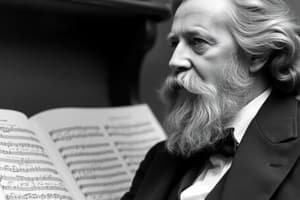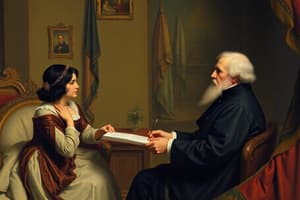Podcast
Questions and Answers
Richard Wagner was primarily known for his symphonies.
Richard Wagner was primarily known for his symphonies.
False (B)
Wagner wrote both the libretto and the music for each of his stage works.
Wagner wrote both the libretto and the music for each of his stage works.
True (A)
One of Wagner's notable innovations was the use of leitmotifs in his compositions.
One of Wagner's notable innovations was the use of leitmotifs in his compositions.
True (A)
Wagner's concept of Gesamtkunstwerk aimed to combine only visual and musical arts.
Wagner's concept of Gesamtkunstwerk aimed to combine only visual and musical arts.
Wagner was influenced by the romantic style of Carl Maria von Weber and Giacomo Meyerbeer.
Wagner was influenced by the romantic style of Carl Maria von Weber and Giacomo Meyerbeer.
Richard Wagner had his own opera house built, the Bayreuth Festspielhaus.
Richard Wagner had his own opera house built, the Bayreuth Festspielhaus.
Wagner's Tristan und Isolde is considered a work that marked the start of classical music.
Wagner's Tristan und Isolde is considered a work that marked the start of classical music.
The Ring and Parsifal were never premiered at the Bayreuth Festival.
The Ring and Parsifal were never premiered at the Bayreuth Festival.
Wagner reintroduced traditional forms into his last few stage works, including Die Mastersingers of New York.
Wagner reintroduced traditional forms into his last few stage works, including Die Mastersingers of New York.
Throughout his life, Wagner enjoyed financial stability and never faced poverty.
Throughout his life, Wagner enjoyed financial stability and never faced poverty.
Wagner's controversial writings on music, drama, and politics have only attracted attention since the early 20th century.
Wagner's controversial writings on music, drama, and politics have only attracted attention since the early 20th century.
Wagner first heard Beethoven's 7th Symphony before Beethoven's 9th Symphony.
Wagner first heard Beethoven's 7th Symphony before Beethoven's 9th Symphony.
Flashcards are hidden until you start studying
Study Notes
Richard Wagner's Life
- Born on May 22, 1813, in Leipzig, Germany
- Youngest of nine children
- Father, Carl Friedrich Wagner, died of typhus six months after his birth
- Mother, Johanna Rosine, was left a widow
Early Education and Influences
- Attended Pastor Watzl's school in Dresden, where he had piano instruction
- Was negligent and self-willed in his studies, struggled to play a proper scale
- Later attended the Dresdner Kreuzchor, a boys choir boarding school
- Became influenced by Gothic opera and began writing his own music and plays
- Was heavily influenced by Shakespeare and Goethe in his first drama
- Heard Beethoven's 7th and 9th Symphonies in 1828, which became a major influence
- Wrote a piano transcription of Beethoven's 9th Symphony
Early Career and Compositions
- Enrolled at Leipzig University in 1831, dedicating himself to musical composition
- Studied the scores of the masters, particularly Beethoven
- Wrote his first symphony, Symphony in C Minor, which was performed in Prague in 1832
- Composed his first opera, Die Feen (The Fairies)
- Established reputation as a composer of works in the romantic vein of Carl Maria von Weber and Giacomo Meyerbeer
Contributions and Innovations
- Revolutionized opera through his concept of the Gesamtkunstwerk ("total work of art")
- Synthesized poetic, visual, musical, and dramatic arts, with music subsidiary to drama
- Wrote essays between 1849 and 1852, describing his vision for opera
- Created the concept of leitmotifs, musical phrases associated with individual characters, places, ideas, or plot elements
- Advanced musical language through extreme chromaticism and quickly shifting tonal centers
- Influenced the development of classical music, with Tristan und Isolde marking the start of modern music
Later Life and Legacy
- Had his own opera house built, the Bayreuth Festspielhaus, with novel design features
- Premiered The Ring and Parsifal at the Bayreuth Festspielhaus
- Annual Bayreuth Festival continues to perform his most important stage works
- Thoughts on the relative contributions of music and drama in opera changed over time, reintroducing traditional forms into his last few stage works
- His writings on music, drama, and politics have attracted extensive comment, including antisemitic sentiments
- Influence spread beyond composition into conducting, philosophy, literature, visual arts, and theatre
Studying That Suits You
Use AI to generate personalized quizzes and flashcards to suit your learning preferences.




